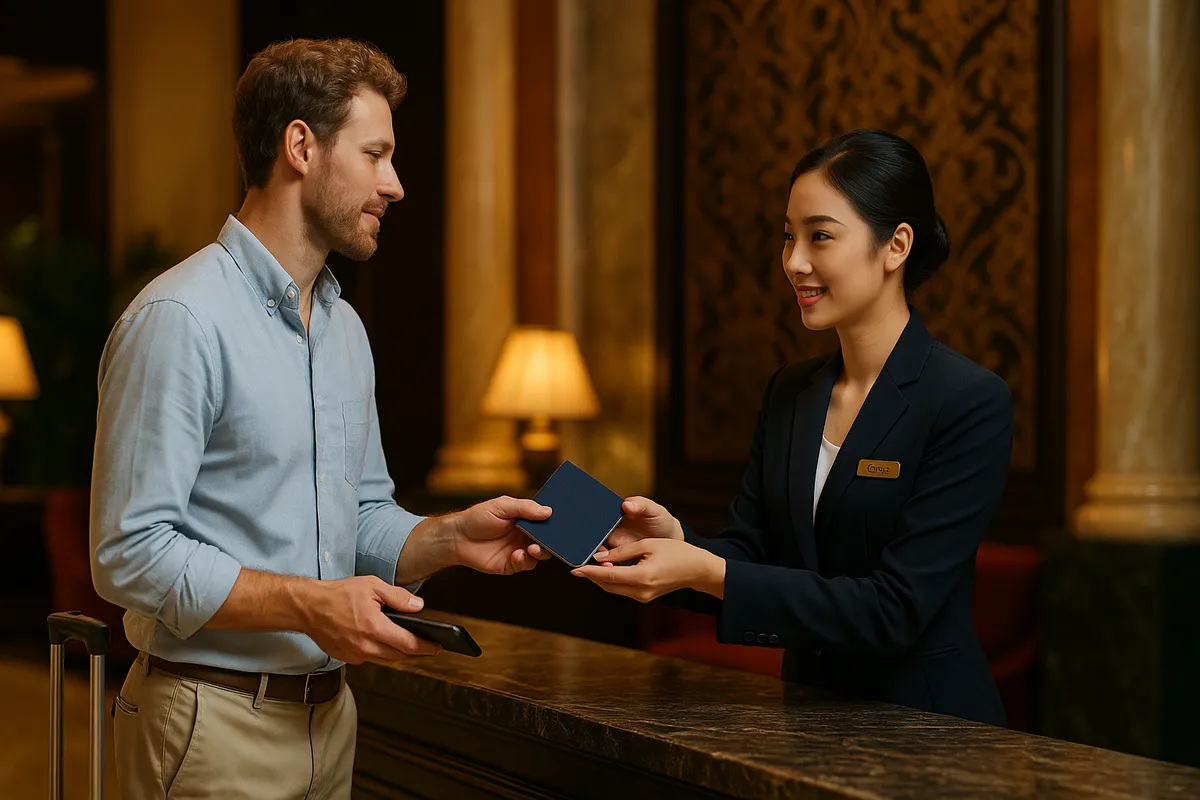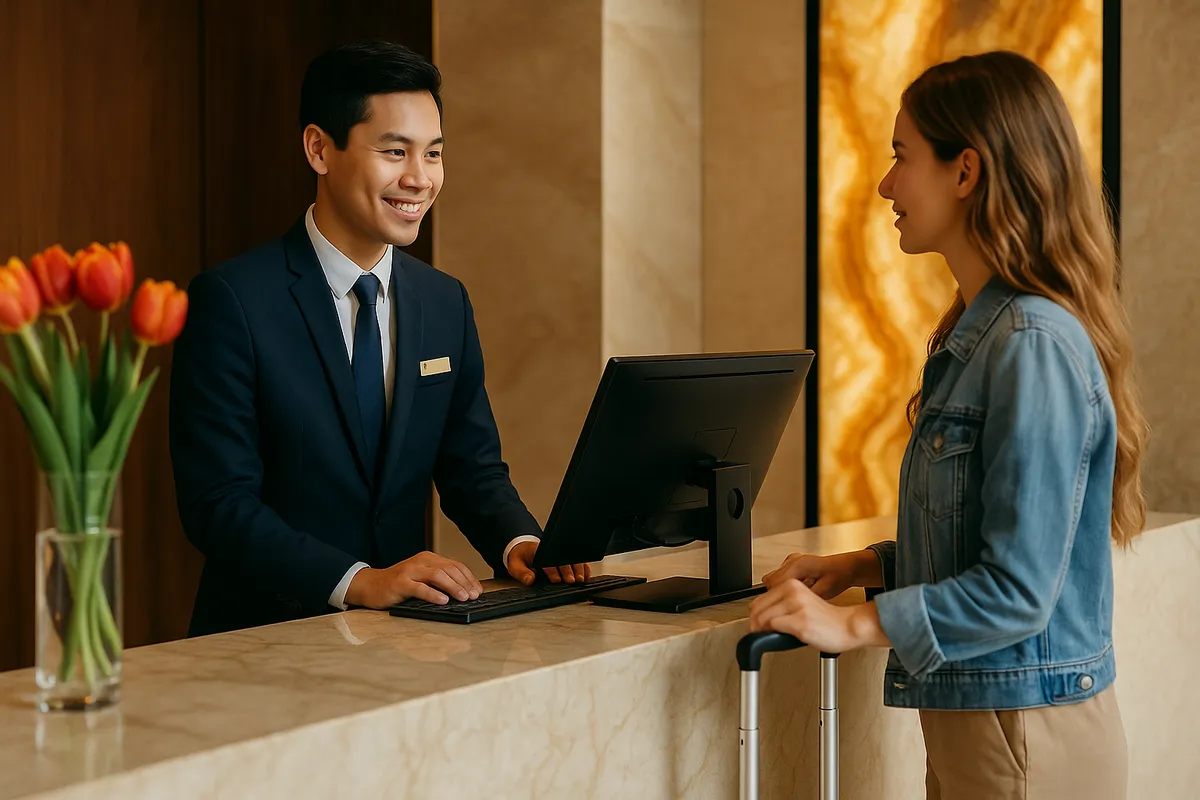Hotel check-in procedures for foreign guests coming to Vietnam
- Friday, May 30, 2025, 11:19 (GMT+7)
Hotel check-in procedures for foreign guests coming to Vietnam
What foreign guests need to prepare for a smooth hotel check-in in Vietnam
When staying at hotels in Vietnam, many foreign guests often feel confused about what documents to prepare, how the check-in process works, or what the expected check-in time is. These misunderstandings may lead to delays, unnecessary fees, or even canceled reservations. To avoid such issues, the following details should be noted:
First, valid identification is mandatory. A valid passport is required for all foreign travelers. A visa must also be presented if the guest does not qualify for visa exemption. These documents must be originals, as hotel staff are required to scan or record them for legal guest registration. If the original is not available for a legitimate reason, a certified copy and a clear explanation may be requested.
Second, booking confirmation is essential. This can be in the form of an email, a booking code, or a QR code from third-party platforms. Guests must ensure that the name on the booking matches the name on the passport. If someone else made the reservation, supporting documents or proof of the relationship between the booker and the guest may be required.
Third, a valid payment method should be prepared. Many hotels require a deposit via international credit card. If no card is available, an equivalent cash amount may be requested. First-time travelers to Vietnam should exchange local currency at reputable locations before arriving at the hotel.
Fourth, the check-in time should be respected. Standard check-in usually starts at 2 PM. If arriving early or late, guests should inform the hotel in advance. Without prior notice, hotels may cancel reservations after a certain cutoff time. Guests arriving early may be allowed to store luggage at the reception and wait for room readiness.
Fifth, special requests should be communicated in advance. If guests have dietary restrictions, mobility concerns, or need specific room features, it is best to note these during the booking process or inform the hotel directly before arrival.
For group travelers, it is helpful to prepare a list with full names, passport details, nationalities, and duration of stay. Children traveling with adults should have their own passport or a copy of a birth certificate. Senior guests or those unfamiliar with technology should opt for in-person check-in for smoother support.
Common mistakes that may lead to denied check-in include arriving late without notice, missing original passport, booking under the wrong name, invalid payment methods, or showing up at the wrong hotel. To avoid these issues, guests should double-check all booking details at least one day before arrival.
Hotel check-in process for foreign guests - Standard protocol for front desk staff
Handling international guests requires front desk staff not only to master standard procedures but also to be flexible and attentive in both communication and problem-solving. Below is a detailed step-by-step guide to ensure efficient, timely, and compliant check-in for foreign guests.
The first step is guest identification. Upon welcoming the guest, politely request identification and booking confirmation. Always check the original passport and verify that the name matches the booking. If a booking code from a third-party platform is presented, verify it with your internal system.
The second step is to review the check-in time and room availability. If the guest arrives within standard check-in hours, proceed as usual. For early or late arrivals, check hotel policy and offer solutions such as early check-in fees or holding the room past regular hours. If a booking has been canceled due to late arrival, assist the guest in finding an alternative.
The third step is guest registration. Enter guest details into the hotel management system or national guest registration platform. Required data include full name, passport number, nationality, check-in and check-out dates. If required, capture a photo of the guest or passport according to local security regulations.
The next step is to request a security deposit. If the guest is unaware of this policy, clearly explain that it is standard procedure to secure room damages or extra services. Offer payment options either via card or cash.
After completing the registration, provide service-related information. This includes breakfast hours, check-out time, hotel amenities, smoking policies, and emergency contact numbers. If the guest has specific requests, ensure they are acknowledged in the system.
During the check-in process, if the guest appears confused, unfamiliar with the language, or hesitant about the steps, use multilingual forms if available or ask for assistance from bilingual staff. Avoid technical jargon and proceed at a comfortable pace.
The following common situations may require flexible handling
- If the guest forgets their passport: ask if a scanned copy or photo is available, and contact management for further guidance.
- If the booking name does not match: request a confirmation email or call the person who made the booking for verification.
- If the guest cannot provide a deposit: suggest alternatives such as holding an ID temporarily or conditional room access.
- If the guest complains about the room: record the complaint, recheck the reservation details, and coordinate with housekeeping or management.
- If children are present: verify if extra charges apply and collect the appropriate documents such as birth certificates or passport copies.
Finally, reconfirm all information on the registration form, have the guest sign, provide the room key or access card, and offer a warm welcome. A clear, professional, and friendly check-in experience is often the first impression guests will associate with the hotel.
Hotel check-in is not just a procedural step but an important part of the guest experience, especially for international travelers. The clearer, more precise, and more attentive the process is, the more confident the guest will feel. When both guest and receptionist understand their roles, check-in becomes a seamless, efficient, and welcoming beginning to a pleasant stay.

 CHECKIN.VN
CHECKIN.VN








Share on